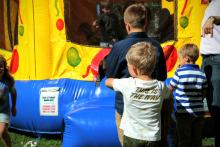I’m both a person with multiple disabilities, and a good worker. The problem with holding those two concepts in tension is my distinct lack of efficiency. I can do the things I’m skilled at regularly – in church contexts, I can pray, preach, receive and count offering, sing, and not only assist in but help to celebrate the Eucharist – but, when I do them, all those tasks are slower and more deliberate than they would be when done by able-bodied people. Moreover, all those tasks may have small pieces missing.










